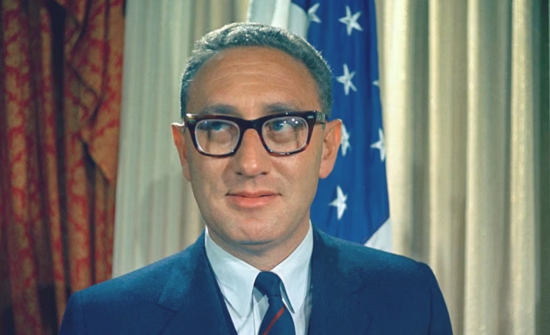
Henry Kissinger, co-architect of Nixon’s 1972 trip to China and betrayal of Taiwan, has died. He was a hundred years old. He lived to see his wishful thinking about China exploded (or re-exploded). Did he notice?
In his book On China, published in 2011, Kissinger cites Dai Bingguo, then State Councilor, a purported champion of Persisting with Taking the Path of Peaceful Development.
Will a country that, for most of its modern period—which in China starts two thousand years ago—regarded itself as the pinnacle of civilization, and that for nearly two centuries has regarded its uniquely moral world leadership position to have been usurped by the rapaciousness of Western and Japanese colonial powers, be content to limit its strategic goals to “build[ing] a moderately prosperous society in all aspects”? It must, Dai answers. China is “not in a position to be arrogant and boastful” because it still faces tremendous challenges domestically….
Dai rejects claims that China will seek to dominate Asia or to displace the United States as the world’s preeminent power as “pure myths” that contradict China’s historical record and its current policies. He includes a striking invitation from Deng Xiaoping—so contrary to China’s usual insistence on self-reliance—to the effect that the world would be allowed to “supervise” China to confirm it would never seek hegemony: “Comrade Deng Xiaoping once stated: If one day China should seek to claim hegemony in the world, then the people of the world should expose, oppose and even fight against it. On this point, the international community can supervise us.” Dai’s is a powerful and eloquent statement. Having spent many hours over a decade with this thoughtful and responsible leader, I do not question his sincerity or intent.
But Kissinger, realist, doesn’t want to seem entirely naïve.
Still, granting that Hu, Dai, and their colleagues are stating in full candor their perspective for the next stage in Chinese policy, it is difficult to imagine that this will be the last word on China’s world role or that it will remain uncontested.
Yes, it is difficult to imagine that Dai’s “powerful and eloquent statement” will be the last word on China’s world role. (As of 2016, Dai himself was fully on board with China’s predatory actions in the South China Sea, saying: “There are sufficient grounds to state that on the South China Sea issue, China is completely at the receiving end of encroachments.” Did Dai change, or had Kissinger failed to perceive him?)
Kissinger ends his ruminations On China, published just before the era of Xi Jinping, by wondering whether China and the United States can get along. In the 2012 afterward to the paperback edition, he warns us that if “the imperative for a new departure” succumbs to “the weight of history” so that the United States is obliged to “defend its interests by traditional precepts,” this will be no vindication for “the advocates of confrontation.” For: “In the end, history lauds not conflicts of societies but their reconciliations.” One could inscribe this dictum on a gold plate.
It is good to have on one’s side that august and weighty but one must say often easily led astray personage, History. A few questions for History: Should societies and persons reconcile themselves to just any kinds of deeds whatever? Should one avoid confrontation with, for example, one’s own government regardless of what it does, in order to ensure being lauded for one’s transcendent willingness to reconcile? Or is it just the other governments that get the free pass?
In 2023, in the era of Xi Jinping, one would have to work even harder than Kissinger does in his book to ignore what getting along with an adamantly grasping Chinese state means, from the perspective of the Chinese state: letting it get away with any and all assaults on individuals and states, within China and outside of China, no matter how horrific, without anybody “interfering” by reporting, criticizing, or failing to cooperate with and enable.
Also see:
Taiwan Communiqué: “Kissinger transcripts show betrayal of Taiwan”
“In that first meeting [with Chinese premier Zhou Enlai], Kissinger volunteered that the US would not support the Taiwan independence movement, would not accept a ‘two-China’ or ‘one China-one Taiwan’ policy and would recognize Taiwan as an ‘inalienable part’ of China. He also indicated the US wanted to fully recognize China sometime within the first two years of Nixon’s second term in office….
“They also worked out a deal on how Beijing would replace the Kuomintang’s seat in the UN—Washington would withdraw its position that the question is an important one, allowing China to be voted into the world body by a simple majority vote. Taipei would be voted out by a two-thirds vote ‘as soon as you can get the two-thirds vote for expulsion,’ Kissinger told Zhou. While Washington would complain loudly about the Taiwan ouster, which its UN envoy George Bush did at the time, it would tacitly accept the switch.”
NSA Archive: Kissinger’s July 14, 1971 memorandum to President Nixon
“Chou said that if China was to be patient it needed three assurances: first, that the US would not support ‘two Chinas’ or a ‘one China, one Taiwan’ policy; second, that we would not support the indigenous Taiwan independence movement; and third, that we would not permit Japanese troops to move in. I stressed that this would be our policy but noted that some events on Taiwan might be beyond our ability to control. Chou interposed no objection.”
China US Focus: “Cooling Off the South China Sea,” remarks of Dai Bingguo at a July 5, 2016 seminar in Washington DC
“The world can see that on the South China Sea issue, China is by no means a wrongdoer or troublemaker, but rather a victim.”





